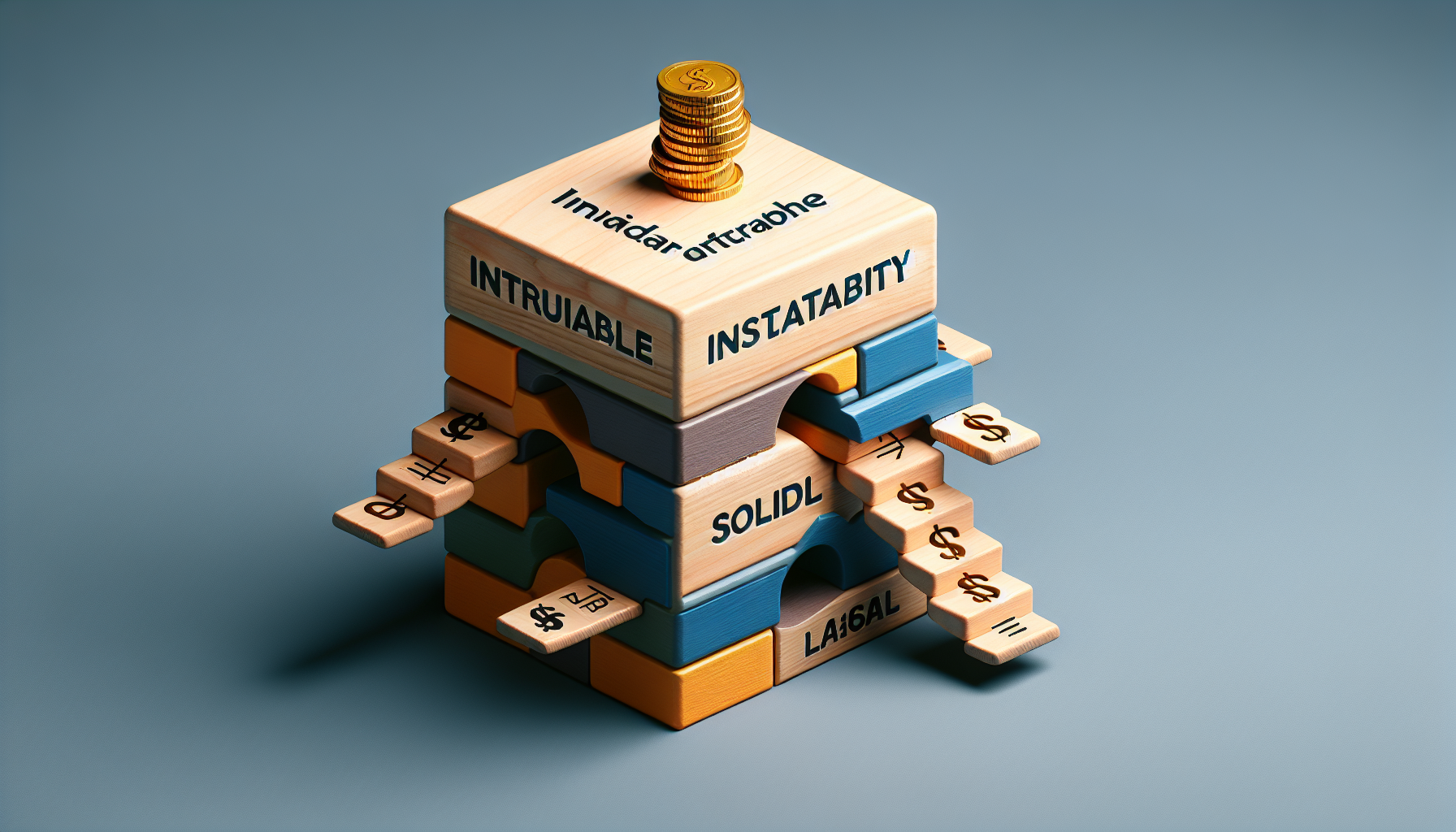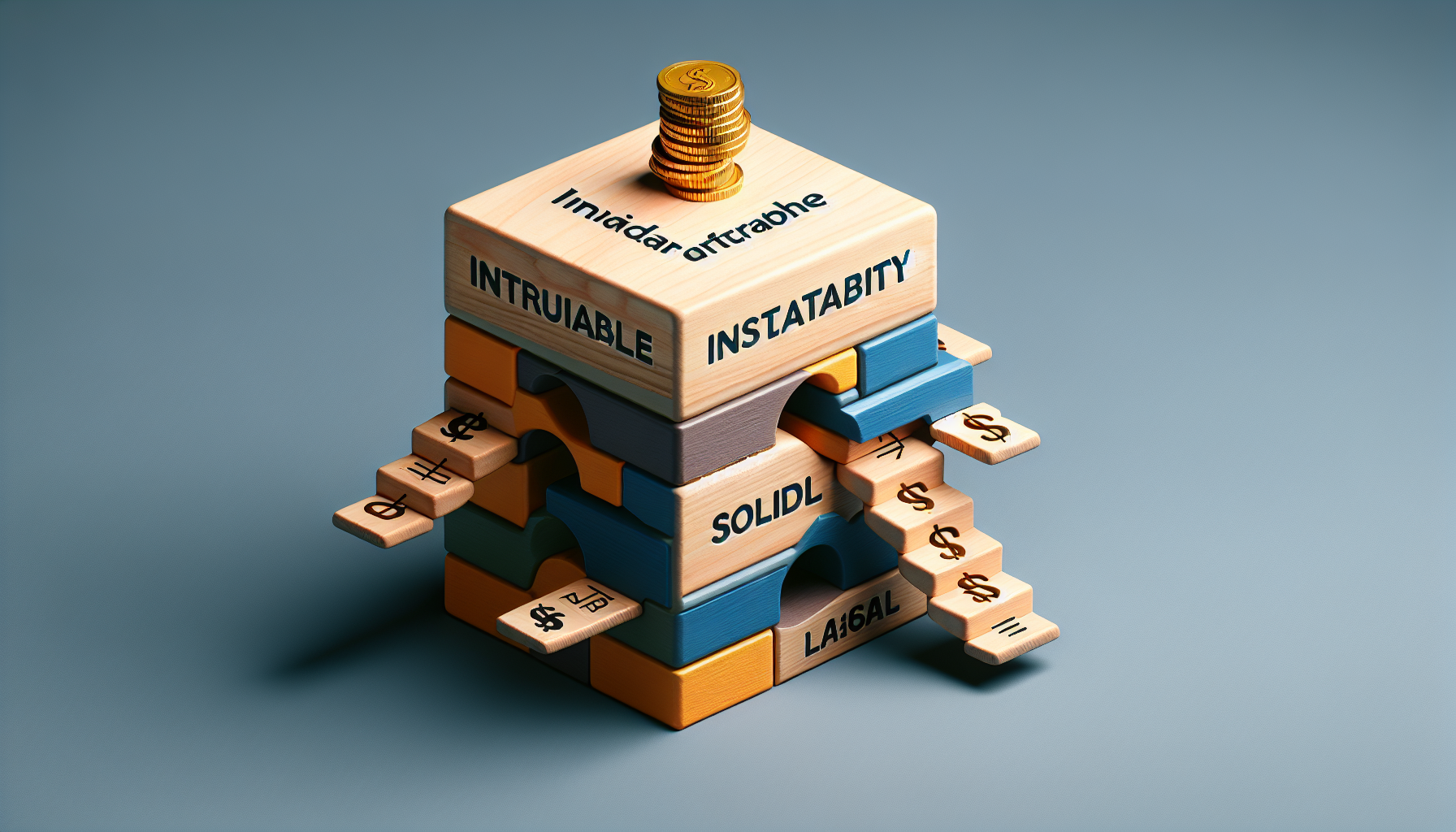Have you ever wondered how to effectively plan for retirement when your income is constantly changing? It can be daunting to think about the future when your financial situation is uncertain. But fear not, because in this article we will explore some practical strategies that can help you establish a solid retirement plan, regardless of the fluctuations in your income. By implementing these tips, you can gain confidence and peace of mind as you navigate the journey towards a secure and comfortable retirement.
Understanding a Fluctuating Income
Factors contributing to a fluctuating income
Having a fluctuating income can pose unique challenges when it comes to planning for retirement. There are several factors that can contribute to a fluctuating income. For example, if you work in a commission-based job or as a freelancer, your income may vary from month to month based on your performance and clients. Additionally, seasonal work or job instability can also lead to fluctuations in income. Understanding the factors that contribute to a fluctuating income is the first step in developing a plan to secure your retirement.
Challenges of planning for retirement with a fluctuating income
Planning for retirement requires careful financial management, and this is especially true when you have a fluctuating income. One of the main challenges is the uncertainty of how much money you will be earning in the future. This uncertainty can make it difficult to create a long-term financial plan and set retirement savings goals. Moreover, irregular income makes it harder to consistently contribute to retirement accounts, which can impact the growth of your investments over time. It is important to be aware of these challenges and develop strategies to overcome them in order to secure your financial future.
Creating a Budget
Tracking your income
When you have a fluctuating income, it is crucial to track your income closely. This will help you understand your cash flow patterns and anticipate any periods of higher or lower income. Start by documenting all sources of income, including irregular ones, and estimate the average monthly income over a longer period of time. By having a clear picture of your income, you can better plan for your expenses and retirement savings.
Determining monthly expenses
To create a budget that works with a fluctuating income, it is important to determine your monthly expenses. Track your expenses over a few months to get an accurate picture of your spending habits. Categorize your expenses into fixed costs (such as rent or mortgage payments) and variable costs (such as groceries or entertainment). This will allow you to find areas where you can cut back during periods of lower income and prioritize your retirement savings.
Allocating funds for retirement savings
Even with a fluctuating income, it is crucial to allocate funds for retirement savings. Set a percentage of your income, rather than a fixed amount, as your target retirement contribution. This way, you can still save for retirement even during months when your income is lower. Automation can also be helpful in ensuring consistent retirement savings by setting up automatic transfers to your retirement accounts. By making retirement savings a priority in your budget, you can gradually build a substantial nest egg.

Building an Emergency Fund
Importance of having an emergency fund
When you have a fluctuating income, having an emergency fund becomes even more crucial. An emergency fund provides a financial safety net during unexpected expenses or periods of lower income. It can help you avoid dipping into your retirement savings prematurely, allowing it to continue growing. Having an emergency fund gives you peace of mind and helps you maintain financial stability, even when your income fluctuates.
Setting savings goals
To build an emergency fund, it is important to set achievable savings goals. Start by determining your monthly expenses and aim to save at least three to six months’ worth of living expenses. This will provide a buffer should you experience a sudden drop in income or unexpected expenses. Break your savings goal into smaller milestones and track your progress along the way. By consistently saving, you can build a solid emergency fund that will protect your financial well-being.
Differentiating emergency funds from retirement savings
It is important to differentiate between your emergency fund and your retirement savings. An emergency fund should be easily accessible and kept in a liquid, low-risk account, such as a high-yield savings account. On the other hand, retirement savings are typically invested in long-term growth assets, such as stocks or mutual funds. By keeping these two funds separate, you can ensure that your retirement savings remain intact for their intended purpose, while still having a safety net for unexpected expenses.
Utilizing Retirement Accounts
Types of retirement accounts
There are various types of retirement accounts available, and understanding their differences can help you make informed decisions about where to invest your savings. Common types of retirement accounts include 401(k)s, IRAs (Individual Retirement Accounts), and Roth IRAs. A 401(k) is offered by an employer and allows you to contribute a portion of your pre-tax income toward retirement. IRAs, on the other hand, are opened by individuals and have contribution limits set by the government. Roth IRAs, similar to IRAs, are funded with after-tax dollars but offer tax-free withdrawals during retirement. Familiarize yourself with the different retirement accounts to take full advantage of their benefits.
Contributing consistently
Having a fluctuating income does not mean you should forgo retirement savings. It is important to contribute consistently, even if the amount varies each month. Aim to contribute a set percentage of your income towards your retirement accounts. This way, you will still be able to save during months when your income is higher and maintain a consistent savings habit. Consistent contributions over time can have a significant impact on the growth of your retirement savings, providing you with a comfortable retirement in the future.
Understanding tax implications
Understanding the tax implications of your retirement accounts is essential when planning for retirement with a fluctuating income. Contributions to traditional 401(k)s or IRAs are typically tax-deductible, which can help reduce your taxable income and potentially lower your overall tax burden. However, withdrawals from these accounts during retirement are subject to income tax. On the other hand, Roth IRA contributions are made with after-tax dollars, meaning withdrawals during retirement are generally tax-free. Consider consulting with a financial advisor or tax professional to determine the best retirement account options for your specific circumstances and to navigate the tax implications effectively.

Diversifying Income Sources
Investing in different assets
Having a fluctuating income highlights the importance of diversifying your income sources. Instead of relying solely on one income stream, consider investing in different assets that can generate income. This can include rental properties, dividend-paying stocks, or even starting a side business. By diversifying your income sources, you can mitigate the impact of income fluctuations and ensure a more stable financial situation, both in the present and for your retirement.
Maximizing income-generating opportunities
When you have a fluctuating income, it is important to actively seek out and maximize income-generating opportunities. This could involve taking on additional freelance projects, seeking higher-paying clients, or acquiring new skills that can lead to higher income potential. By continuously looking for ways to increase your income, you can not only strengthen your financial position in the present but also boost your retirement savings over time.
Millennial retirement saving strategies
Millennials, in particular, face unique challenges when it comes to planning for retirement with a fluctuating income. However, there are specific strategies that can help this generation secure their financial future. One such strategy is utilizing a health savings account (HSA) as a retirement savings tool. HSAs offer tax advantages, as contributions are tax-deductible, growth is tax-free, and withdrawals for qualified medical expenses are tax-free. Additionally, millennials can leverage digital platforms and apps that provide micro-investing opportunities, allowing them to save and invest small amounts of money consistently over time.
Minimizing Debt
Creating a debt repayment plan
Minimizing debt is crucial when planning for retirement, especially with a fluctuating income. Start by creating a debt repayment plan that prioritizes high-interest debt, such as credit card balances. Pay off outstanding balances as aggressively as possible, focusing on making more than the minimum monthly payments. By reducing your debt burden, you will free up more money to allocate towards retirement savings, ensuring a stronger financial foundation for your retirement.
Managing credit card debt
Credit card debt can quickly accumulate, especially if there are periods of lower income. It is important to manage credit card debt effectively by paying off balances in full each month to avoid accruing high-interest charges. If you cannot pay the full balance, focus on paying more than the minimum payment to reduce your debt faster. Additionally, consider negotiating with credit card companies to lower interest rates or explore balance transfer options to consolidate and pay off debt more efficiently. By managing credit card debt wisely, you can minimize financial stress and allocate more funds towards retirement savings.
Avoiding high-interest loans
When your income fluctuates, it is crucial to avoid high-interest loans whenever possible. High-interest loans, such as payday loans or cash advances, can lead to a cycle of debt that becomes difficult to escape. Instead, focus on building an emergency fund and establishing a solid financial cushion to rely on during times of lower income. By avoiding high-interest loans, you can reduce your financial burden and allocate more funds towards retirement savings.

Seeking Professional Guidance
Working with financial advisors
When planning for retirement with a fluctuating income, seeking professional guidance can provide valuable insights and help you navigate complex financial decisions. A financial advisor can help you develop a personalized retirement plan that takes into account your unique income situation. They can assess your current financial standing, assist in setting realistic retirement goals, and recommend investment strategies that align with your risk tolerance. By working with a financial advisor, you can feel more confident about your retirement plans and make informed choices that impact your financial well-being.
Considering retirement planning services
retirement planning services can also be helpful when faced with a fluctuating income. These services often provide online tools and resources that can assist you in creating a retirement plan tailored to your income situation. They can help you estimate future retirement income based on different scenarios and guide you in making important decisions related to retirement savings. Consider researching and utilizing retirement planning services that align with your needs to supplement your own efforts in securing a comfortable retirement.
Exploring online resources
In addition to professional guidance, there are numerous online resources available to help you plan for retirement with a fluctuating income. From budgeting apps to retirement calculators, these resources can provide valuable insights and information. Online forums and communities also offer opportunities to connect with individuals facing similar financial situations and share experiences and strategies. By exploring these online resources, you can gain knowledge, ideas, and support to effectively plan for retirement despite the challenges of a fluctuating income.
Adapting to Life Changes
Adjusting retirement savings during periods of financial stability
Life can be unpredictable, and it is important to adapt your retirement savings strategy during periods of financial stability. When your income is higher, take advantage of the opportunity to contribute more towards your retirement accounts. Consider increasing your retirement savings percentage, making catch-up contributions if eligible, or diversifying your investment portfolio to capitalize on growth opportunities. By adapting your retirement savings strategy during periods of financial stability, you can make the most of favorable circumstances and boost your retirement nest egg.
Evaluating retirement plans during income fluctuations
With a fluctuating income, it is necessary to regularly evaluate and adjust your retirement plans. Periodically review your retirement savings goals and assess whether they are still realistic based on your income fluctuations. Consider revising your savings target when necessary and make any necessary adjustments to your budget and retirement contributions. By staying vigilant and proactive, you can ensure that your retirement plans remain aligned with your financial circumstances and long-term goals.
Focusing on long-term financial goals
When navigating a fluctuating income, it is important to maintain a focus on your long-term financial goals, including retirement. During periods of lower income, it can be easy to become discouraged or tempted to forego retirement savings altogether. However, it is crucial to maintain a long-term perspective and remember the importance of saving for retirement. By continually reminding yourself of your financial goals and the future you envision, you can stay motivated and make the necessary financial decisions to secure a comfortable retirement.

Evaluating Risk Tolerance
Understanding risk tolerance
Risk tolerance refers to an individual’s comfort level with the potential fluctuations and volatility of investments. When planning for retirement, it is important to evaluate your risk tolerance, especially with a fluctuating income. A higher risk tolerance may mean being more comfortable with market fluctuations and investing in more aggressive growth assets. On the other hand, a lower risk tolerance may lead to a more conservative investment approach. Understanding your risk tolerance will help you make informed decisions about where to allocate your retirement savings and strike a balance between risk and stability.
Assessing investment decisions
When you have a fluctuating income, assessing investment decisions becomes crucial. Diversification is key to managing risk, so consider spreading your investments across a range of asset classes and sectors. This can help mitigate the impact of any single investment underperforming. Regularly monitor and reassess your investment portfolio to ensure it aligns with your risk tolerance and long-term goals. Depending on your circumstances, it may be beneficial to consult a financial advisor or investment professional for guidance in making investment decisions that are suitable for your risk tolerance and income situation.
Balancing risk and stability
Finding the right balance between risk and stability is essential when planning for retirement with a fluctuating income. While higher-risk investments have the potential for greater returns, they also come with increased volatility and the risk of substantial losses. On the other hand, more stable investments may offer lower returns but provide a safer financial cushion. Consider diversifying your investments to strike a balance between risk and stability. By having a mix of growth assets and more conservative options, you can protect your retirement savings while still giving it the potential to grow.
Considering Part-Time Work
Supplementing income through part-time jobs
When faced with a fluctuating income, considering part-time work can be an effective strategy to supplement your earnings. Taking on a part-time job during periods of lower income can provide a consistent source of income and help bridge any financial gaps. Look for opportunities that align with your skills and interests, and consider work-from-home options that offer flexibility. By supplementing your income with part-time work, you can maintain financial stability and continue making contributions towards your retirement savings.
Transitioning to retirement gradually
For those with a fluctuating income, transitioning to retirement gradually can offer financial security and peace of mind. Instead of completely retiring once you reach a certain age, consider gradually reducing your working hours or moving from full-time to part-time work. This can provide a smoother transition into retirement and ensure a more stable income stream. By gradually transitioning to retirement, you can continue saving for retirement while also enjoying the benefits of reduced work hours.
Maintaining skill sets
With a fluctuating income, it is important to maintain and update your skill sets to remain competitive in the job market. As technology and industries evolve, staying current with the latest trends and developments can open new opportunities for income generation. Invest in continuous learning through workshops, online courses, or professional certifications. By maintaining and expanding your skill sets, you can increase your earning potential and ensure financial stability both in the present and during retirement.
In conclusion, planning for retirement with a fluctuating income requires careful consideration and strategic decision-making. By understanding the factors contributing to a fluctuating income, creating a budget that adapts to income fluctuations, building an emergency fund, utilizing retirement accounts wisely, diversifying income sources, minimizing debt, seeking professional guidance, adapting to life changes, evaluating risk tolerance, and considering part-time work, you can overcome the challenges associated with a fluctuating income and secure your financial future. Remember to stay proactive, maintain a long-term perspective, and continuously reassess your retirement plans to ensure they align with your income situation and long-term goals. With the right strategies and mindset, you can navigate the complexities of a fluctuating income and enjoy a comfortable and financially secure retirement.


